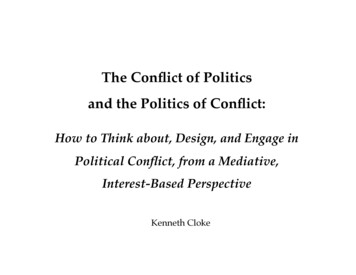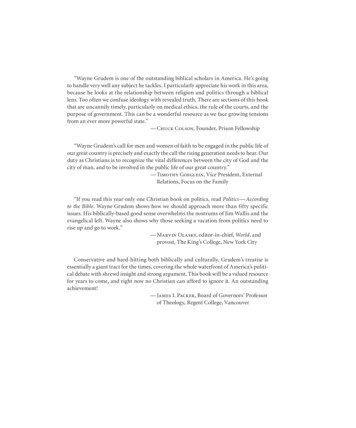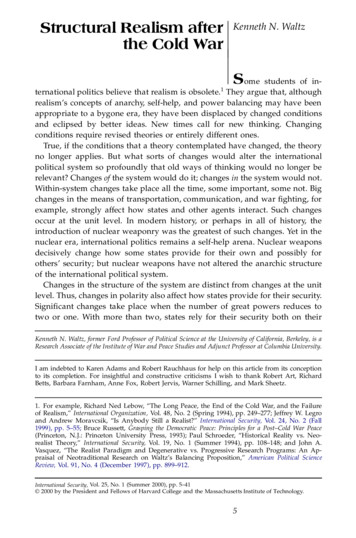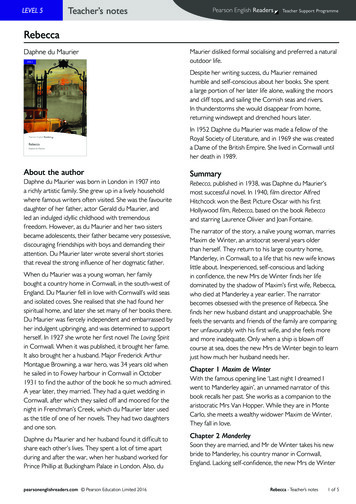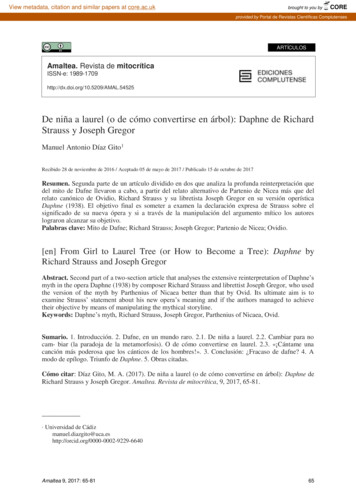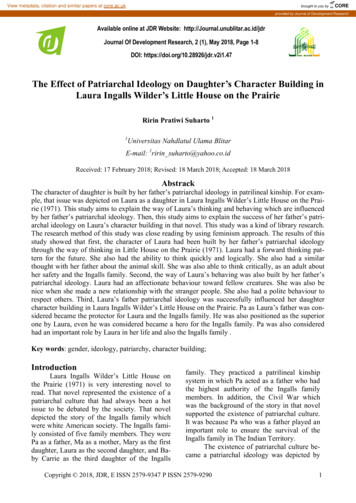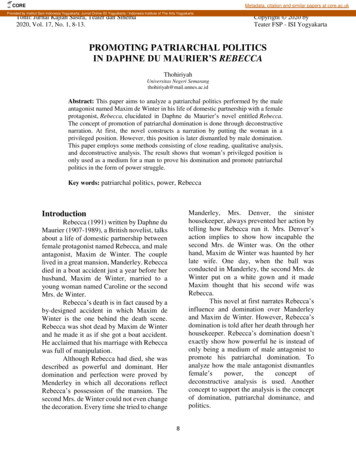
Transcription
COREMetadata, citation and similar papers at core.ac.ukProvided by Institut Seni Indonesia Yogyakarta: Jurnal Online ISI Yogyakarta / Indonesia Institute of The Arts YogyakartaTonil: Jurnal Kajian Sastra, Teater dan Sinema2020, Vol. 17, No. 1, 8-13.Copyright 2020 byTeater FSP - ISI YogyakartaPROMOTING PATRIARCHAL POLITICSIN DAPHNE DU MAURIER’S REBECCAThohiriyahUniversitas Negeri Semarangthohiriyah@mail.unnes.ac.id.Abstract: This paper aims to analyze a patriarchal politics performed by the maleantagonist named Maxim de Winter in his life of domestic partnership with a femaleprotagonist, Rebecca, elucidated in Daphne du Maurier’s novel entitled Rebecca.The concept of promotion of patriarchal domination is done through deconstructivenarration. At first, the novel constructs a narration by putting the woman in aprivileged position. However, this position is later dismantled by male domination.This paper employs some methods consisting of close reading, qualitative analysis,and deconstructive analysis. The result shows that woman’s privileged position isonly used as a medium for a man to prove his domination and promote patriarchalpolitics in the form of power struggle.Key words: patriarchal politics, power, RebeccaManderley, Mrs. Denver, the sinisterhousekeeper, always prevented her action bytelling how Rebecca run it. Mrs. Denver’saction implies to show how incapable thesecond Mrs. de Winter was. On the otherhand, Maxim de Winter was haunted by herlate wife. One day, when the ball wasconducted in Manderley, the second Mrs. deWinter put on a white gown and it madeMaxim thought that his second wife wasRebecca.This novel at first narrates Rebecca’sinfluence and domination over Manderleyand Maxim de Winter. However, Rebecca’sdomination is told after her death through herhousekeeper. Rebecca’s domination doesn’texactly show how powerful he is instead ofonly being a medium of male antagonist topromote his patriarchal domination. Toanalyze how the male antagonist ve analysis is used. Anotherconcept to support the analysis is the conceptof domination, patriarchal dominance, andpolitics.IntroductionRebecca (1991) written by Daphne duMaurier (1907-1989), a British novelist, talksabout a life of domestic partnership betweenfemale protagonist named Rebecca, and maleantagonist, Maxim de Winter. The couplelived in a great mansion, Manderley. Rebeccadied in a boat accident just a year before herhusband, Maxim de Winter, married to ayoung woman named Caroline or the secondMrs. de Winter.Rebecca’s death is in fact caused by aby-designed accident in which Maxim deWinter is the one behind the death scene.Rebecca was shot dead by Maxim de Winterand he made it as if she got a boat accident.He acclaimed that his marriage with Rebeccawas full of manipulation.Although Rebecca had died, she wasdescribed as powerful and dominant. Herdomination and perfection were proved byMenderley in which all decorations reflectRebecca’s possession of the mansion. Thesecond Mrs. de Winter could not even changethe decoration. Every time she tried to change8
9Previous StudyThere are several studies conductedby the previous researchers which concernmore on intrinsic analysis of the novel suchas characters and characterizations, andnarration strategy. Parey (2015) reveals ahaunting figure of Rebecca, while Linkin(2016) focuses on the narrator’s deceptivestrategy in Rebecca revealing the narrator’sshift and character in telling the charactersunder the narratological lens. Anotherresearch conducted by Morden (2016)concerns on female identity construction inRebecca. A study dealing with patriarchalpolitics promotion through dismantlingfemale’s position and dominant character isnot conducted yet. Thus, this research isaimed to show that the haunting character ofRebecca and the identity formation of thefemale protagonist are only media for themale to promote his sense of patriarchalpolitics.1999). Finally, alternative meaning can beembraced.Method and DataThe method employed to analyze the data isusing deconstructive-based steps. Thedeconstructive steps in analyzing the novelare as follows: first, analyzing the textstructurally by using the structuralistapproach to figure out the oppositions;second, reversing the outset meaning whichhas been structurally analyzed by usingdeconstruction approach. By using thedeconstruction approach it is hoped that I canrevealanotherassumptionshowingalternative meaning behind the constructedtext. Meanwhile, the primary data used in thispaper is gained in the novel in the form ofexcerpts.Results and DiscussionRebecca: A Premature Assumption ofPowerful WomanDeconstructive TheoryDeconstruction thought adopts Derrida’sideas which he borrows structuralismanalysis as “the basis of and starting point”.Deconstruction provides another alternativemeaning of the literary work sincedeconstruction has characteristic of polyinterpretation. Deconstruction starts firstlywith the establishment of binary opposition.Secondly, establishing the binary opposition,the next step is deciding the hierarchicalposition i.e. privileged and non-privilegedpositions. Then, after the hierarchicalposition has been decided, the next step is,subverting the hierarchical position (Bressler,In Rebecca, there is a polemic betweenwoman and man that can be seen in its plotstructure. The plot is dominated by seriousconflict afflicting women in her relation tomen in marriage life. The serious marriagelife conflict is reflected in the life of Rebeccaand her husband’s – Maximilian de Winter(Maxim de Winter).In Rebecca, Maurier describespowerful Rebecca’s domination in marriagelife. Although Rebecca has already died, herdomination over Manderley and her life stillexist. Man character, who is represented byMaximilian de Winter, Rebecca’s husband,
10seems so powerless to defeat Rebecca’sdomination. The aforementioned plotstructure leads to the premature assumptionthat woman has powerful domination overman in domestic life. Below is a schemeshowing Rebecca’s plot structure based onstructural analysis.ClimaxRising dfrom Wardoyo (2004)Picture 1. Rebecca’s plot structure schemeIncentive Moment in Rebecca startswhen Caroline and Mr. de Winter meet eachother in Monte Carlo. Then the RaisingAction happened when they both decide toget married and Caroline becomes Mrs. deWinter. they both live in Manderley. Mrs.deWinter cannot able to adapt to the life ofManderley so that she tends to be weak andpowerless. In addition, she cannot able toavoid Rebecca’s shadow in Manderley.Those aforementioned Mrs. de Winter /Caroline’s weak and powerless characterslead to the Climax of the story i.e. the internalconflict between her and her husband, Maximde Winter. Maxim cannot escape from theshadow of Rebecca’s domination. It makeshim become temperament.Daphne du Maurier, Rebecca, Renarrated by Margaret Tarner (1991):“All my memories are unhappy”(p.13).“I found out the truth five daysafter we were married. We were inthe hills near Monte Carlo. It wasthe same place I went to woth you.Do you remember? She sat there inthe car and told me terrible, evilthings about herself. Thisngs that Icould not tell anyone.”“She knew that I would neverdivorce her” (p.90).I thought about Manderley toomuch,.I told her that Manderleywas mine” (p.91).“And she smiled at me again. Shewas smiling when I killed her. thebullet went through her heart”(p.92).Maxim cannot forget Rebecca sincehe has a very unpleasant memory with herdealing with her domination in their marriageand domestic life. Maxim is being traumaticperson caused by Rebecca. His traumatriggers him to kill Rebecca by shooting her.De winter’s Trauma cannot be erasedalthough Rebecca had already died. Rebeccacauses so many troubles for de Winter’s life.De Winter lives in fear because of hisconspiracy in killing Rebecca considered as aserious crime. His conspiracy brings to thefalling action plot i.e. Mr. de WinterJudgement. The litigation is closed by theresolution namely Mr. de Winter’s impunity.Mr. de Winter gets the impunity since thecourt cannot prove his fault.In the above plot structure, there canbe seen that there is a binary oppositionbetween woman and man. The woman isrepresented by Rebecca, while the man isrepresented by Maxim de Winter. Rebeccahas dominant power in the domestic arena inmarriage life. Hence, The plot structureproofs that woman has powerful dominationover the man.The plot structure cannot be separatedfrom Rebecca’s action. As the centre of thestory, Rebecca actuates and leads the story tothe tension of the story. The tension isdivided into two that are internal andinterpersonal conflicts of the character of Mr.De Winter. The internal conflict possessed by
11Mr. De Winter deals with psychologicaldepression, while the interpersonal conflictof him is the messy relation with his youngwife, Caroline. The marriage life of Mr. DeWinter and Caroline is in the shadow ofRebecca which resulted in isolated marriagelife. De Winter’s incapability of surrenderingthe shadow of Rebecca indicates man’simpotency in controlling power. Man who isidentically attributed to a superpower is beingsubdued by the woman.Then, it might be concluded that thenovel entitled Rebecca highlights the issue ofwoman domination over a man. However, itis too early to conclude that woman hasstrong domination over a man. Theaforementioned structural analysis must bedug out more in order to find out the realassumption of Rebecca’s alternativemeaning.Rebecca: A Means of Promotion ofPatriarchal PoliticsReferring to the above analysisnamely in the falling action till resolutionsessions, there is a possibility of rejecting theabove premature conclusion. Thus, it isneeded to do further analysis of the text inorder to get the real meaning of Rebecca. Tofigure out the implicit alternative meaning ofthe novel, the decontruction approach is used.The established binary oppositionsare the opposition between woman and manrepresented by Rebecca and Maxim deWinter. The structural analysis places thewoman in a privileged position, while theman is in a non-privileged position. A womanis placed in a privileged position because thewoman has power in dominating man inmarriage life, while the man is being placedin a non-privileged position because of hisincompetency to control life. For detail, thebinary opposition is clearly described by thetable below.Table 1. Oppositional structural analysis offemale protagonist’s vs male antagonist’spositionsStructural analysisFemale protagonist Male ProtagonistPrivileged position Non-privilegedpositionRebeccaMr. De WinterWomanManExist,dominant, toneless,minorpowerful(being dominated),powerlessReferring to the third step of deconstruction,the oppositions above then can be subvertedto be as follows:Table 2. Subverted position analysis offemale protagonist vs male antagonistDeconstructionFemale protagonist Male ProtagonistPrivileged position Non-privilegedpositionMr. De WinterRebeccaManWomanExist, powerfuldied, powerlessFrom the above subversion table, itcan be seen that man successfully takescontrol over woman power. It is seen by thecharacters in the novel in which Maxim as theman character succsessfully subduesRebecca. By conquering Rebecca, now,Maxim places himself in the privilegedposition. The privileged position indicatesthe existence of Maxim. Besides, it indicatesthe power of Maxim. On another side,Rebecca’s death leads her to be in the nonprivileged position. Death has symbolizedthe loss of the woman. This proposition issupported by the below variant structure offalling action and resolution plot which aretelling the final resolution of the story ofMaxim’s safe and impunity.
12Mr. De Winter Conspiration of Rebecca’sdeath SafeFrom the structure above, it can beseen that man who is represented by Maximde Winter is safe and get impunity from thecrime he had committed to. If indeed thenovel titled Rebecca brings meaning towomen’s ability to dominate the lives of men,the meaning seems to be rejected by thestructure presented in the falling action andresolution above. If indeed the novel focuseson the assumption of the defense of women'sposition, the falling action and resolution inthe story suppose to end in severe punishmentfor the man who has committed crimes.The initial binary opposition structureestablished by structural analysis is nowbeing deconstructed. The man is now not inthe non-privileged position but the privilegedposition swapping the woman’s position. Thewoman who is previously in the privilegedposition, now it is changed to be in the nonprivileged position or marginal. The structureof the privileged position of woman is nowpartially dismantled. The destruction of thestructure is not only dismantling theprivileged position of women but also gettingrid of the structure of power domination thatwoman has. Considering the resolutionstructure for the plot climax that shows thetriumph of man, it can be concluded thatactually, the text is trying to promote politicalpatriarchy.The existence of the term“patriarchy” refers to the dichotomy ofwoman and man. the term woman and manrefers to the “sex-based classification”(Warnke, 2007, p. 4). Thus, the termpatriarchy is the terminology used in a sociallife where men are placed as the mainauthority figure. Politics signifies not only“elections” and “campaign” but also signifieshow a person or a group of people attempt tochange and form the decision. Politics makesa person or group of people participateactively in the “power struggle” (Putman,2008, p. 7).In Rebecca, the tendency ofpatriarchal politics done by the man characteri.e. Maxim de Winter. The power struggle isdone by taking power over the woman. In thepower struggle, Maxim actively makesradical decision including killing his politicalopponent, Rebecca.Bullet VS HeartThe marriage formed by Maxim is such aconditional marriage with the ultimate aim ispower. Maxim’s world view to possessManderley leads him to place his wife,Rebecca, not as the wife but the adversary.Maxim de Winter who during his life wasbeing dominated by Rebecca, the ruler ofManderley, starts actively doing “powerstruggle” by killing his opponent, Rebecca.“The bullet went through her heart”(du Maurier, 1991, p. 92).The quotation above shows the powerstruggle made by Mr. de Winter in gainingpower. Mr. de Winter decides to fire a bulletinto his adversary’s heart because his goal is“Manderley was mine” (du Maurier, 1991, p.91). Manderley is a symbol of powerpossession.AccordingtoRisakotta(2002/2003), “power is closely related toviolence, domination, and pressure.” Itmeans that power is the ability to force thedesire or demand of authority, even by usingviolence. Violence is, then, considered to besomething close to domination. Risakotta(2002/2003) defines domination as a politicalprinciple for conquering and controllingsomething by exploiting somebody in orderto gain economic benefits or power.In gaining his desire of possessingManderley, Maxim uses the violence that isphysical violence namely by shootingRebecca. By possessing Manderley, it means
13someone has political and economical power.Seen from the point of view of politicalpower, a person who controls Manderley hasthe power to place himself as the ruler whocan dominate the dwellers of Manderley.From an economic perspective, Manderley issuch an attribute of wealth. By the wealth thathe is now possessed, Maxim has access todominate the business that previouslyhandled by , the first meaning of Rebecca as apowerful woman figure in the story ispartially dismantled. Rebecca is a means forthe man to show his existence. Self-existencecan be obtained with power due to power onecan perform the domination of others. In thepower struggle, man tends to place thewoman as an opponent. In such a relation,man does not hesitate to commit radical actswith the intention to seize power from hisopponent. When the power has alreadypossessed, the man is able to show hisexistence and domination. No matter asstrong as any woman, man is someone whoclings to power till the end. That phenomenonhas been described in the novel entitledRebecca which Maxim de Wintersuccessfully subdues Rebecca by using thebullet in order to be dominant and powerful.By using Rebecca, Maxim successfullypromoting patriarchal politics with itssuccessful goal of possessing power anddomination.ReferencesBressler, C.N. (1999). Literary Criticism: AnIntroduction to Theory and Practice.New Jersey: Prentice Hall, Inc.du Maurier, Daphne. (1991). Rebecca. Renarrated by Margaret Tarner. Jakarta:Dian Rakyat.Linkin, H.K. (2016). The DeceptivelyStrategic Narrator of Rebecca. Journalof Narrative Theory, Volume 46,Number 2, Summer 2016, pp. 223-253.Parey, Armelle. (2015). Daphné du Maurier’scharacters in Rebecca living on in Mrsde Winter. E-rea - Revue électroniqued’études sur le monde anglophone,Laboratoire d’Études et de Recherchesur le Monde Anglophone, 2015,10.4000/erea.4731.hal-02274534Putman, John C. (2008). Class and GenderPolitics in Progressive-Era Seattle.Nevada: University of Nevada Press.Risakotta, Adeney. B. (2002/2003). “TeoriKekuasaan dari Bawah”. In “RENAI –Jurnal Politik Lokal dan SosialHumaniora Indonesia.Wardoyo, Subur. (2004). “A Roadmap intoLiteary Reasearch Method” in TheTapestry of English LanguageTeaching and Learning in Indonesia.Malang: State University of Malang.Warnke, Georgia. (2007). After Identity:Rethinking Race, Sex and Gender.Cambridge: Cambridge UniversityPress.
Daphne du Maurier, Rebecca, Re-narrated by Margaret Tarner (1991): "All my memories are unhappy" (p.13). "I found out the truth five days after we were married. We were in the hills near Monte Carlo. It was the same place I went to woth you. Do you remember? She sat there in the car and told me terrible, evil things about herself.


